NEW WEEKLY SERIES!
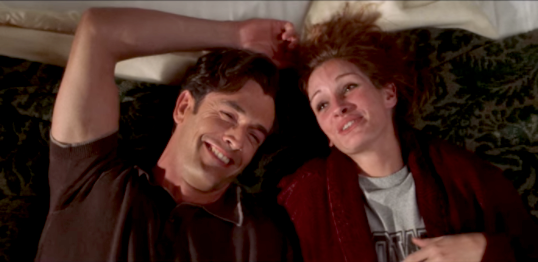
The trope of the “gay best friend” proves that not all representation is created equally. In the 90s especially, we finally got to see openly gay characters in big Hollywood movies, specifically romantic comedies. Before that, queer characters were often only coded as such. While this representation was a step forward, the types of LGBTQ+ representation were always the same: white, cis gay men without an interior life. Throughout this series, I want to revisit these characters and examine the good, the bad and the ugly of their portrayal and how it has shaped the culture of today.
George Downs (Rupert Everett) embodies a lot of what is bad about the “gay best friend” trope. So why do I love him so much? It’s not just because Everett is incredibly charming and handsome. George starts out as a sidekick and becomes the “love interest.” Sure, we never get to spend time with him a queer man and learn more about his love life and relationships. Still, he's the force that shapes and defines the narrative. That this happens in a $100 million plus Julia Roberts blockbuster is no small feat...
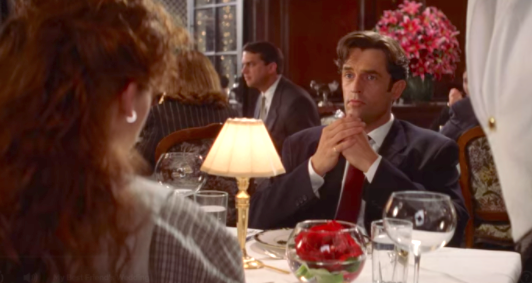 George's introduction is in the opening scene (4:25 minutes in)
George's introduction is in the opening scene (4:25 minutes in)
For those who haven’t seen My Best Friend’s Wedding (what’s wrong with you), let’s get into a quick plot description. Julianne (Julia Roberts) is a salty food critic who made a pact with her college “best friend,” Michael (Dermot Mulrooney), that if they turned 28 and weren’t married they would marry each other. When Michael calls Julianne on his 28th birthday, she believes he’s going to take her up on the bet. Quite the opposite, he announces he’s marrying Kimmy (Cameron Diaz), a college student, in just four days. Julianne flies to the wedding with plans to break it up, plans that get even more complicated when Kimmy asks her to be her maid of honor.
So where does George fit in? As Julianne’s editor and best friend, he’s her sounding board when Julianne thinks Michael is going to take her up on the bet. The character really gets to have fun when Julianne calls him in as backup. George flies to Chicago to persuade Julianne to deal with her feelings and talk to Michael. Ever the drama queen, Julianne quickly lies and says George is her fiance, leading to a perfect line:
Julianne: He just came in for few hours to uh, to uh, FUCK ME.
George: Huh! Takes a few hours.
This article may be about George, but it has to be said that Julia Roberts’ line readings have never been better.
In 1997, especially in romantic comedies, gay best friends were never sexualized. Yes, we don’t get any interiority to his actual sex life as a gay man. Still, trying to sell him as a sexual prospect for the largest A-list movie star at the time, Julia Roberts, is a half-step in the right direction. This fake relationship escapes some gross "passing" territory because George is able to still be himself while pretending to be something else. He’s giving a half-hearted attempt at playing straight. There’s only so far he would go for Julianne.
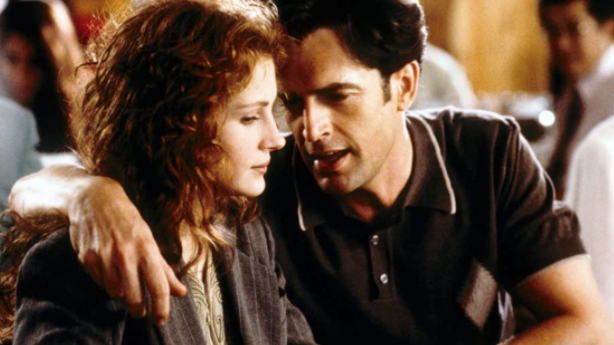 "Say a Little Prayer" ranks as the best musical moment in a movie full of iconic musical moments (opening credits, Kimmy's karaoke slay)
"Say a Little Prayer" ranks as the best musical moment in a movie full of iconic musical moments (opening credits, Kimmy's karaoke slay)
What does any gay best friend do when they’re thrust back into the closet for a scheme to break up a straight wedding? They stage a giant musical number, of course! At lunch with the wedding party, George goes too far in the pursuit of making Michael jealous. He leads a rousing rendition of “Say a Little Prayer” that endears himself to the entire Wallace clan, less so to Michael or Julianne. While it relies on the stereotype of gays loving musical extravaganzas, it’s an important moment that defines George as a character, rather than a function of the plot. He’ll go along with Julianne’s scheme, but he won’t change who he is so she can get her man. If he’s going to fly to Chicago and pretend to be Julianne’s fiance, then why not make a show out of it.
This also establishes George’s stakes in the situation. At this moment, he’s not interested in destroying Kimmy’s wedding. He’s interested in helping Julianne work out her feelings for Michael and giving her the space and distraction to do so. In essence, George is the essence of chaotic neutral here (or neutral Terminator).
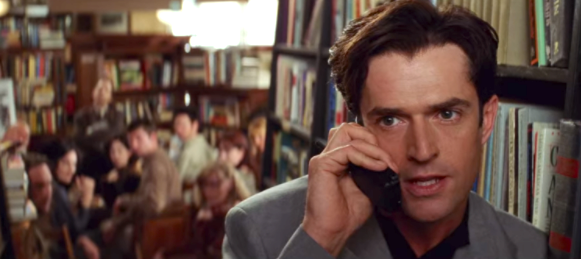 Everyone is looking behind to hear what's happening with Julianne, naturally.
Everyone is looking behind to hear what's happening with Julianne, naturally.
However, nowhere is George more effective than in the film’s big chase. After Kimmy sees Julianne kiss Michael, there’s a high speed pursuit through Chicago. Having stolen the catering cart, Julianne gives George a frantic call while he is at a book reading. Upon getting the call, George gives a knowing, slightly embarrassed nod to the rest of the crowd at the reading. It’s a hilarious sort of shrug that seems to go, “ugh, straight people, am I right?” Of course, that’s reading too much into it. Plus, this very stodgy, very white book reading doesn’t seem like the queerest of spaces. However, Everett carves out a moment where we see George’s perspective and life outside Julianne. He gets a chance to somewhat halfheartedly acknowledge, “I know, she’s crazy right?”
George: Michael's chasing Kimmy?
Julianne: Yes!
George: You're chasing Michael?
Julianne: YES!
George: Who's chasing you... nobody, get it? There's your answer. It's Kimmy.
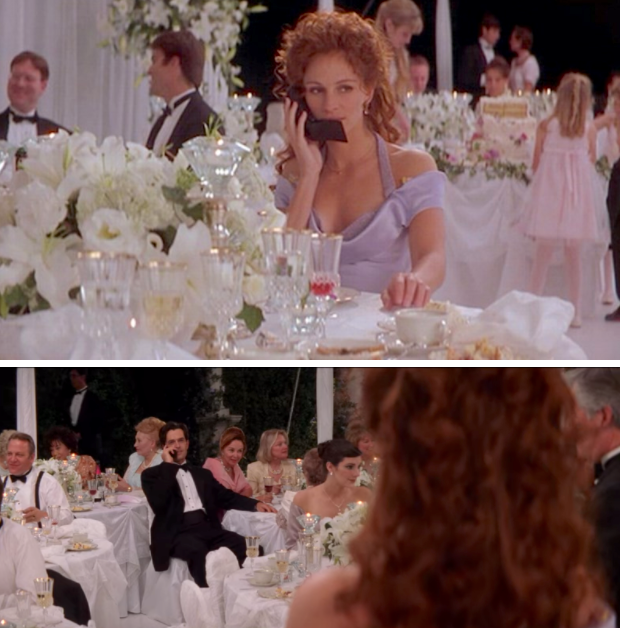
Yes, this is an example of the gay best friend being a wise oracle for the heroine. Still, Everett delivers the line reading so well, you can forgive the predictability. George hits Julianne with a bucket of cold water rather than coddling her. It’s said out of love, because George truly loves her. But Everett nails that George is exasperated. He’s tired of her shit. He’s flown to Chicago once and is about to do so again. She puts him through a lot of bullshit. Scratch that, she puts everyone through a lot of bullshit.
My Best Friend’s Wedding works because both writer Ronald Bass and star Julia Roberts understand how horrible Julianne is. Charlize Theron takes pages from this same playbook in her indelible performance in Young Adult. Smartly, George also knows how horrible Julianne is. Yet, he loves her because of her rough edges, not in spite of them.
Of course… then there’s George's ending monologue:
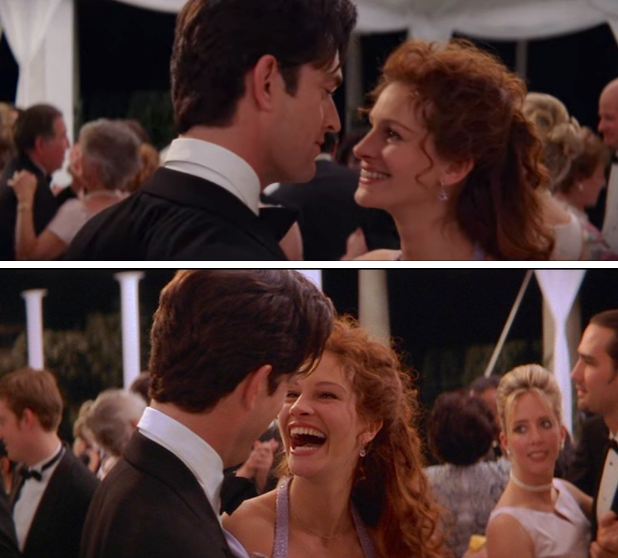
"Suddenly, a familiar song. And, you're off your chair in one, exquisite movement... wondering, searching, sniffing the wind like a dapple deer. Has God heard your little prayer? Will Cinderella dance again? And then, suddenly, the crowds part and there he is: sleek, stylish... radiant with charisma. Bizarrely, he's on the telephone. But then, so are you. And then he comes towards you... the moves of a jungle cat. Although you quite correctly sense that he is... gay... like most devastatingly handsome single men of his age are, you think... what the hell. Life goes on. Maybe there won't be marriage... maybe there won't be sex... but, by God, there'll be dancing.”
Julianne embarked on this quest in search of a husband when she was actually in search of a titular best friend. She had clung to her relationship with Michael like a life raft, rather than expanding her post-collegiate friendships. She said goodbye to Michael and Kimmy not knowing what would be next for them. Yet, George surprises Julianne at the reception in a fantastically staged reveal. Director P.J. Hogan really milks the entire phone call in delightful fashion. As George drops hints that he can see her, she scans the reception area almost as if she’s in a horror movie. Roberts knows how to give great reaction shots and hold the audience’s attention.
When she finally spies George waiting at another table, he saunters over with all the charisma and confidence of James Bond. After all, George is Julianne’s one true love. He’s the one that was chasing after her, being her confidant and shoulder to cry on and going along with her schemes. The final scene creates a wholly original version of true love. Yes, it’s still a man and a woman, but it’s the bond between a woman and her gay best friend. While the two dance the night away, Julia Roberts flashes her trademark smile. George has been the hero all along.
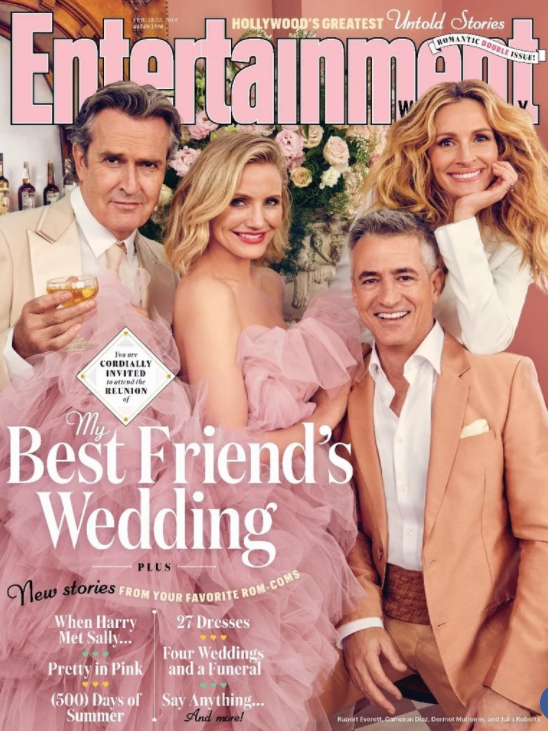 EW reunited the cast just last year for a reunion coverIt’s worth noting that it was rare for this type of role to be played by an out gay man. Everett had come out professionally in 1989, which posed severe limits on the types of roles he was offered. This partially explains what makes George such a refreshing figure, even if he’s not always used to his fullest potential. By having an out gay man play him, the character feels fully fleshed out. Even when he’s flamboyant or singing, George exists in a grounded universe, more so than some of the wackier characters (love you Rachel Griffiths and Carrie Preston). As we’ll see through this series, these characters often come off more cartoon-ish when played by straight actors.
EW reunited the cast just last year for a reunion coverIt’s worth noting that it was rare for this type of role to be played by an out gay man. Everett had come out professionally in 1989, which posed severe limits on the types of roles he was offered. This partially explains what makes George such a refreshing figure, even if he’s not always used to his fullest potential. By having an out gay man play him, the character feels fully fleshed out. Even when he’s flamboyant or singing, George exists in a grounded universe, more so than some of the wackier characters (love you Rachel Griffiths and Carrie Preston). As we’ll see through this series, these characters often come off more cartoon-ish when played by straight actors.
We began with My Best Friend’s Wedding because it expertly embodies all the machinations of a romantic comedy while also twisting them. It shows you can make a different picture with the same puzzle pieces. George is still very much the prototypical gay best friend. However, the way he was used in the plot and given depth by Everett represented a major turning point. For those reasons, this felt like a good place to start in examining the trope. There will be worse versions, there will be better versions. Diversity will (slowly) make its way into the framework. Still, George is who I instantly think of when I think of a “gay best friend.”
Are you a fan of this movie? Which "gay best friend" would you like to see covered in this series?